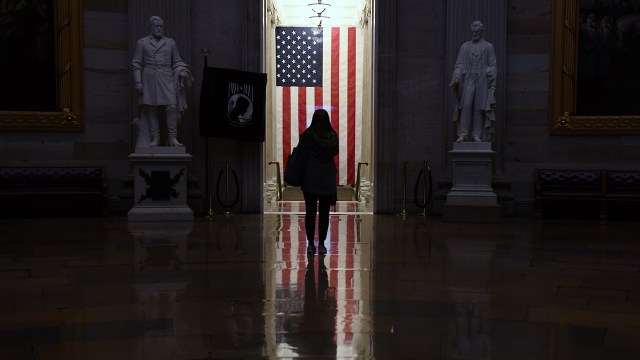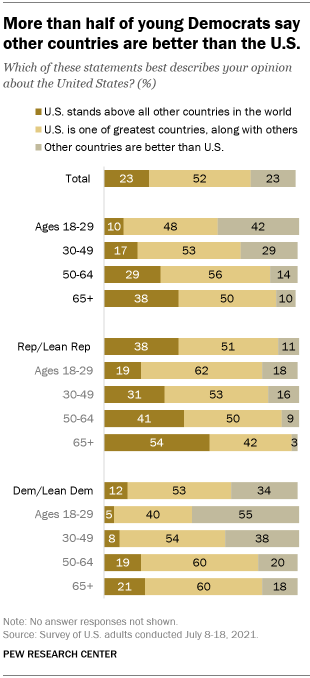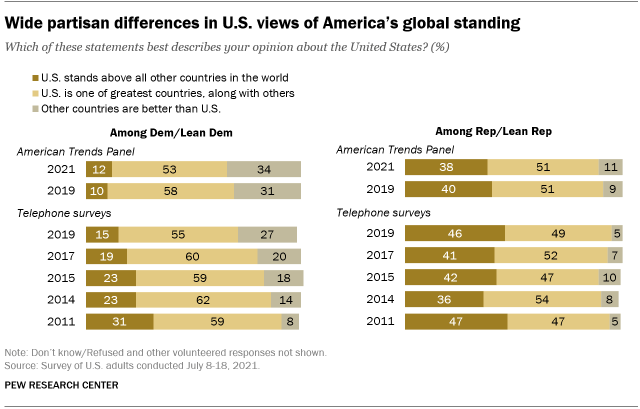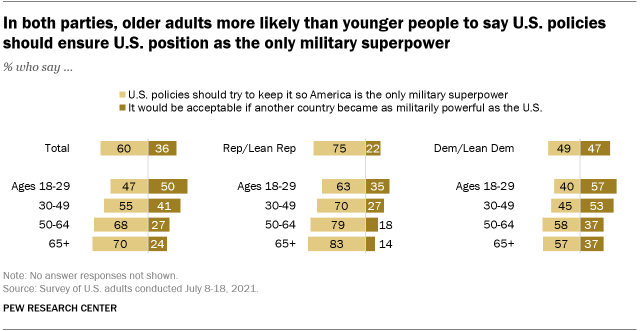
Note: See this post for more recent data on this question.
Young people in the United States express far more skeptical views of America’s global standing than older adults. They are also more likely to say it would be acceptable if another country became as militarily powerful as the U.S., according to a Pew Research Center survey of U.S. adults conducted in July.
Pew Research Center conducted this study to understand the public’s view of the United States’ standing in the world. For this analysis, we surveyed 10,221 U.S. adults in July 2021. Everyone who took part is a member of the Center’s American Trends Panel (ATP), an online survey panel that is recruited through national, random sampling of residential addresses. Recruiting our panelists by phone or mail ensures that nearly all U.S. adults have a chance of selection. This gives us confidence that any sample can represent the whole population (see our Methods 101 explainer on random sampling).
To further ensure that each survey reflects a balanced cross-section of the nation, the data is weighted to match the U.S. adult population by gender, race, ethnicity, partisan affiliation, education and other categories. Read more about the ATP’s methodology and the methodology for this report.
Here are the questions used for this report, along with responses, and its methodology.

Overall, about half (52%) of Americans say the U.S. is “one of the greatest countries, along with some others.” Nearly a quarter say instead that the U.S. “stands above all other countries” (23%), while an identical share (23%) says “there are other countries that are better than the U.S.”
Opinions about the nation’s global standing have changed little since 2019. However, the share of adults saying there are other countries that are better than the U.S. is higher than it was a decade ago, with most of the increase coming among Democrats.
There continue to be wide age differences in views of how America compares with other countries. Roughly four-in-ten adults ages 18 to 29 (42%) say there are other countries that are better than the U.S. – the highest share of any age group.
Age differences in these views are evident within both partisan coalitions. A majority (55%) of Democrats and Democratic-leaning independents under age 30 say there are other countries that are better than the U.S., as do 38% of those 30 to 49. By comparison, just 20% of Democrats ages 50 and older say this.
Among Republicans and Republican-leaning independents, 18% of adults under 30 say there are other countries that are superior to the U.S., compared with just 6% of Republicans 50 and older who take this view. But younger Republicans are considerably less likely than older Republicans to say the U.S. is the greatest nation: 19% of those ages 18 to 29 say this, compared with 31% of those 30 to 49, 41% of those 50 to 64 and 54% of those 65 and older. Over the past two years, Republicans under age 30 have grown less likely to say that the U.S. stands above all other countries in the world: 19% express this view today, down from 34% in 2019. A far larger share now say that the U.S. is one of the greatest nations, along with some others (47% in 2019 vs. 62% today).
Views of how the U.S. compares with other countries have long been divided along partisan lines – and the partisan gap in views of the United States’ standing today remains large. Today, about a third of Democrats say there are other countries that are better than the U.S.; just 11% of Republicans say the same. And while 38% of Republicans say the U.S. stands above all other countries, just 12% of Democrats say this. These shares are roughly on par with partisans’ views of the U.S. in 2019.

Differences in views of the country’s global standing extend beyond partisanship. Pew Research Center’s 2021 political typology revealed stark differences among typology groups in views of the U.S., even within partisan coalitions. For example, Faith and Flag Conservatives are the only group in which a majority (69%) says the U.S. stands above all other countries; clear majorities of those in three other GOP-oriented typology groups overwhelmingly say instead that the U.S. is among the greatest nations in the world, along with some others. Conversely, Progressive Left (75%) and Outsider Left (63%) are the only typology groups in which majorities say there are other countries better than the U.S. Most of those in other Democratic-oriented groups take the position that the U.S. is among a small number of greatest countries in the world.
When it comes to views of America’s status as a military superpower, a majority of adults (60%) say that U.S. policies should try to maintain the country’s position as the only military superpower, while 36% say it would be acceptable if another country were to become as militarily powerful.

Mirroring age divides in attitudes about the United States’ global standing, younger adults are more likely than older adults to say it would be acceptable if another country became as militarily powerful as the U.S.
A majority (57%) of Democrats under age 30 say it would be acceptable if other nations became as militarily powerful as the U.S., while Democrats ages 30 to 49 are more divided on this question. Democrats 50 and older are more likely to say policies should try to keep it so the U.S. remains militarily superior than to say it would be acceptable for another country to gain similar military strength (58% vs. 37%).
Though a majority of Republicans across age groups say that U.S. policies should try to keep it so America is the only military superpower, 35% of Republicans under 30 say it would be acceptable if another country became as militarily powerful as the U.S., compared with smaller shares among older Republicans.
Note: Here are the questions used for this report, along with responses, and its methodology.
This is an update of a post published Jan. 8, 2020.



